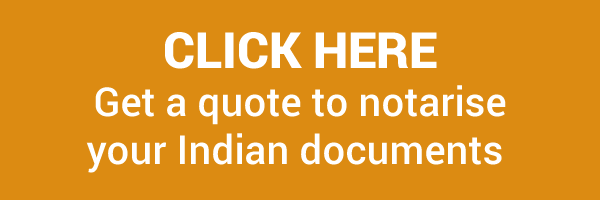One of the challenges of living in Australia but buying or selling property in India is being able to sign the various legal documents necessary for the transaction to happen. Since most of the legal documents are still in paper form (ie, not electronic), it requires your signature - or perhaps someone to sign on your behalf.
Appointing someone to sign legal documents on your behalf can only really be done by a power of attorney.
If you're living in Australia and appointing someone in India by power of attorney to sign documents on your behalf, then that power of attorney must be notarised by a notary public.
Who writes the power of attorney?
In most cases, your lawyer or whoever is looking after your transaction in India should write the power of attorney for you. Sometimes it may just be a standard document or standard form, and sometimes it may be something specific to your situation or to your transaction. If you need to have a power of attorney to apply for a loan with a bank, sometimes the bank will have a standard power of attorney form that you can just download from the internet - but always make sure you know what you're signing.
Many clients download documents and forms from the internet (sometimes from different countries) and assume that they will 'work' in India - this is wrong and it's dangerous. Different countries have different legal requirements and different legal consequences. Don't assume that something you can download from the internet will work for your situation. Even a power of attorney based on the standard forms available in Australia isn't necessarily going to work or work properly for what you want to do in India. Check with your lawyer in India and if you don't have a lawyer, maybe it's about time you engage someone to assist you with your transaction. The cost of the process in Australia and the risk you face in sending an incorrect document to India isn't worth the risk.
Why does the power of attorney need to be notarised?
Documents signed in Australia but used in India generally need to be notarised. Depending on who you're sending the power of attorney to, they may also need the power of attorney to be stamped with an apostille from the Department of Foreign Affairs and Trade (DFAT) and stamped by VFS (ie, Indian Consulate stamp). Unfortunately, despite assisting clients sending documents to India for many years (nearly 20 years) everyone does it differently or they're asked for different things by their lawyer or whoever they're dealing with in India. What's common between all is having the document notarised - but after that, you'll just need to check.
What does notarisation involve?
For the power of attorney going to India, notarisation generally means you must sign the power of attorney in front of the notary public. The notary public can witness your signature and then sign/stamp your power of attorney confirming that they witnessed you sign it.
Do you need stamped paper?
Some clients who have their lawyers in India prepare the power of attorney and send it to them in paper form have their power of attorney printed on stamped paper (or bonded paper). This is like a form of pre-paid duty.
Stamped paper for isn't available in Australia so if you intend to sign a power of attorney printed on stamped paper then you'll need to arrange for it to be prepared in India and sent to you here. Alternatively, most clients print their power of attorney on standard A4 paper and have their signatures notarised on that type of paper. Duty is still payable in India but instead of pre-paid duty if your power of attorney had been printed on stamped paper, then your lawyer would need to arrange for it to be post-paid after the power of attorney arrives in India.
Does the power of attorney need to be stamped with an apostille?
Technically, as Australia and India are both member countries of the Apostille Convention (see here for more information) documents like the power of attorney sent from Australia to India, or any other member country, should be stamped with an apostille in order to be recognised.
Practically, the majority of power of attorney that we've notarised over the years have been used in India without an apostille. If you're not sure, please check with your lawyer in India.
What next?
To obtain a quote on our notary public services for India, please visit https://www.notary-parramatta.com.au/notary-fees/.
Acknowledgements
This blog is supported and maintained by Phang Legal. Phang Legal is a leading provider of notary public services in Sydney. With offices conveniently located in Parramatta, Phang Legal supports and services the Indian community across Sydney with readily available and easily accessible notary public services at highly competitive rates.
For more information regarding notary public services for documents going to India, view our notary publications at https://www.notary-parramatta.com.au/jurisdiction/india-notary/.
Frequently asked questions regarding our notary public services can also be found at https://www.notary-parramatta.com.au/faqs/.
For Hindi to English translation services by NAATI accredited translators, see https://hindi-naati-translation.blogspot.com.au/.

Ern Phang
Notary Public
Ern Phang is the solicitor director of Phang Legal and a notary public. Ern regularly writes about his experiences as a notary public, including the kinds of problems and solutions that his clients face when sending documents to India.
IMPORTANT: the information in this article is correct at the time of publication, however the law constantly changes. This means you should always refer to the most recent articles because we try to update this blog on a regular basis with the most current information.

